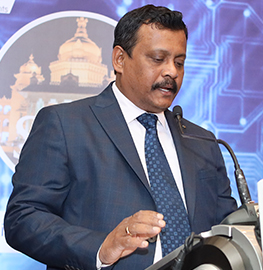Mr. Mrutyunjay Mahapatra, M.D & CEO - Syndicate Bank
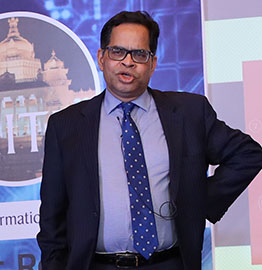
Mrutyunjay Mahapatra, M.D & CEO - Syndicate Bank took to the stage to speak on the new Digital channel. While reimagining how banking would be in a Real Time world, he said, "In a book called ‘Death of a Banker’, where the author has written that in the 19th century England, two categories of people became very powerful - Bankers and Doctors. Not because they have money but because they know everyone’s secret." “Bankers are the trust holders of the society. What happens in the baking system today will happen in the other systems tomorrow. A major disruption that we will witness in the companies in the coming times is that they will no longer need CIOs, because the CEO will be the CIO. IT, digital, security are becoming the survival skills; in today’s scenario no one can afford to say that security is the CISO’s job or IT is CIO’s job. Risk has today become all pervasive; if risk for a banker is defined as credit risk or reputation risk and if everything is managed through algorithm, then you cannot escape the world of privacy, robotic process automation and so on. They have become a part and parcel of all our lives. The concept of enterprise security is therefore disruptive. Gone are the days when by security you would only mean password protection or privacy or data protection.”
Mr. K Alagesan, CMD - ITI Limited
The next presentation was given by K Alagesan, CMD - ITI Limited who addressed the audience on how ITI brings opportunities to the country and the corporates. “ITI had been a pioneer in developing network security in 1985 by giving an encryption equipment to the defence. From that day onwards we had started giving network security; we started with 16 Kbps and have now come up to 10 Gig. There are almost 3000 equipments available on the field. There is a project called Army Static Switch Communication Network (ASCON) project. ITI has bagged the project and have completed the Phase I and Phase II of that project for deploying and maintaining its strategic communication network across the country. There is another project called the Defence Communication Network of which ITI is again a part of. We would like to keep this momentum going. Other projects that we are doing include datacenters; from 350 racks we are now expanding our datacenters to 1000 racks. We are also a pioneer in manufacturing smart cards, the requirement of which is going to be huge since today we are talking of One Nation One Card in the country.”
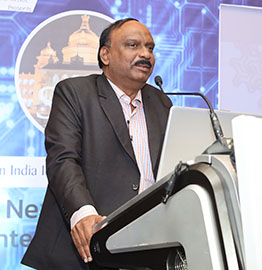
Mr. G B Shaikh, CISO - NISSAN Digital

The keynote address was given by G B Shaikh, CISO - NISSAN Digital, who touched upon the topic of 'Connected Car Cyber Security'. “If you are driving a connected car with your family and it gets hacked and the entire acceleration system goes out of control, what will you do? There is a big transformation happening in the automobile industry, which is why with the coming of autonomous cars it is becoming important for us to protect our lives. There is a paradigm shift happening in the mobility world, which we term it as ACES (Autonomous, Connected, Electric, Shared). If you look at the entire eco-system that is getting developed, cars are not only becoming driver-less but it is moving towards complete automation. But at the same time, connected cars will lead to improved safety, reduced congestion, fuel savings, time savings and also new business revenues.”
Mr. Manish Sinha, E.C - CIOs of India
The first presentation for the evening was given by Manish Sinha, E.C - CIOs of India, who spoke about the changes that are taking place in the industry, a context to set the survival strategies of CIOs. “As someone leading an elite group like CIOs of India, I understand that at this point, we are not only performing the role of a CIO but we have lot many roles. It is not always about project management or delivering business value. Because we are individuals and have our own personal lives besides a professional life. We started introspecting ourselves and decided to help the CIO community of how we can bring more value to it. We began that by rewriting few of the rules and unlearning some of the things that we as CIOs always had in mind. A CIO is taking part in digital transformation but to balance his own role, he has other areas also. Most of the time we are undergoing a lot of change in the workplace, be it the technological change, or any management change. We have to embrace these changes but there are also a few requirements before we start doing that.”
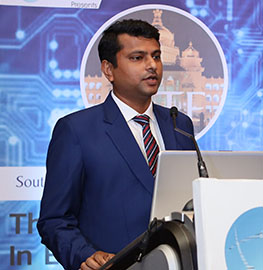
Mr. Krunal Patel, Sales Head, India & South Asia - TeamViewer
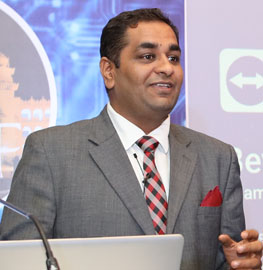
Krunal Patel, Sales Head, India & South Asia - TeamViewer presented the company’s perspective on how newer technologies are bringing newer opportunities. “The story of TeamViewer all started in 2003 when an engineer in Germany was looking for a solution for him to work from home but he is unable to bring his office work to home. That is the problem he solved and came out with an engineering tool and that’s how TeamViewer started. A benchmark has been set in the industry that stated that there is the need for security but look at the scenario when everything will be artificial intelligent and everything will be automated. What will remain? Only human intelligence will remain. And that’s what TeamViewer does – we empower people. We empower people to help people. That is how we survive and because of this quality we have been successful in crossing 2 billion subscribers on this planet.”
Mr. Rahul Raj Singh, Regional Manager, South India - Extreme Networks
Rahul Raj Singh, Regional Manager, South India - Extreme Networks presented his views on how his company is securing enterprises with newer opportunities. “Extreme Networks was founded in 1996 and we are headquartered in California. We have a global presence and have 500+ patents in networking. Over the years we have seen a lot of SIs outsourcing their CAT Teams but we at Extreme Networks own it. This gives a lot of confidence to our customers that we are an end-to-end OEM of the highest order. In the journey of last 20 years, we have seen many developments; one among them is that we have become a clearly software defined company and not a box selling company. Over a period of time we have figured the areas or solutions where we are lacking. We have strategically acquired companies to make sure that our entire portfolio is end to end, right from datacenter to the edge. In 2016, we acquired the wi-fi division of Zebra that it had earlier taken over from Motorola. In 2017, we acquired the IP networking division of Avaya.”
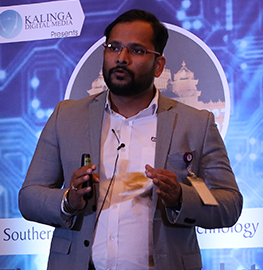
Mr. Vivek Tyagi, Director Sales India - Western Digital Corporation
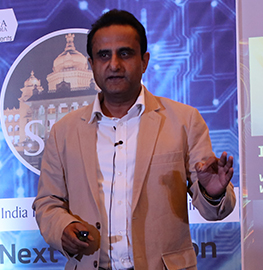
In the Corporate presentations, Vivek Tyagi, Director Sales India - Western Digital Corporation spoke about the technologies and solutions bringing newer opportunities for the partners and customers. “Western Digital has been a leader in high performance storage and historically the largest hard drive manufacturing company. In 2016, Western Digital bought SanDisk, which is again a leading brand in NAND flash memory. The combined company is now $20 billion and has emerged as the largest data storage company in the world. Western Digital and SanDisk have a history of great innovation and one of the richest patent portfolios in the world, with over 14,000 patents. A large amount of data is being getting generated today, both as an enterprise and as a consumer. For segregating this data into two parts, we have coined the terms Big Data and Fast Data. Big Data is the massive amount of unstructured data that organizations have been generating. The decision whether to keep that data or delete it is not yet being made since at any point of time you might find use of it.”
Dr. Deepak Kumar Sahu, President & CEO, VARINDIA
In his inauguration speech, Dr. Deepak Kumar Sahu, President & CEO, VARINDIA spoke about a recent survey with 300 CIO/CTOs, where sixty percent of the respondents said that "C-suite collaboration" is very important - making it the most important issue in our 2019 survey. "From a recent survey with 300 CIO/CTOs, sixty percent of the respondents say that “C-suite collaboration” is very important-making it the most important issue in our 2019 survey. For this both CIO and CMO alignment is required to drive the business growth when it comes to delivering the kind of digital experiences that customers demand."
